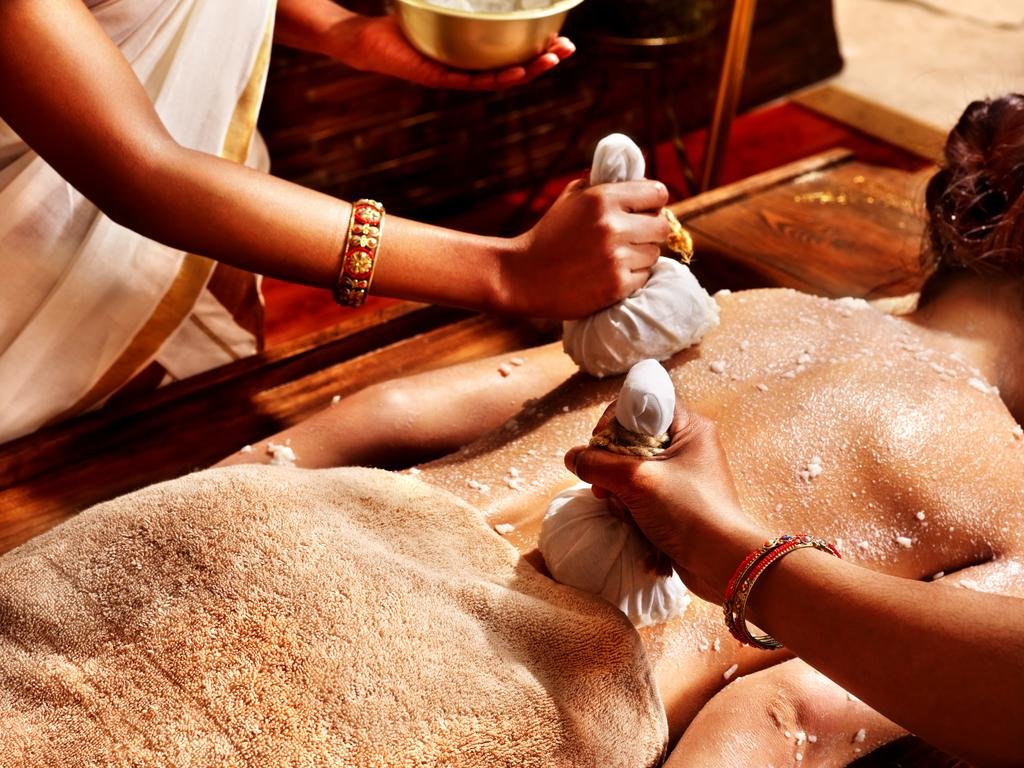Introduction
Ayurvedic retreats have emerged as a popular solution, offering a holistic approach to wellness and rejuvenation. These retreats provide an opportunity to disconnect from the hustle and bustle of modern life and reconnect with our inner selves through the ancient wisdom of Ayurveda.
At our organization, we specialize in curating transformative Ayurvedic retreat experiences. In this comprehensive guide, we’ll take you on a step-by-step journey through what you can expect from an Ayurvedic retreat, helping you make an informed decision about embarking on this transformative journey.
What is Ayurveda?
Before diving into the details of Ayurvedic retreats, it’s essential to understand the philosophy and principles behind Ayurveda. Ayurveda is an ancient Indian system of medicine that dates back thousands of years. It is rooted in the belief that health and well-being are achieved through a delicate balance of mind, body, and spirit.
Ayurveda recognizes three fundamental energies, known as doshas, that govern our physical and mental characteristics:
- Vata (air and space)
- Pitta (fire and water)
- Kapha (water and earth)
The goal of Ayurveda is to maintain a harmonious balance of these doshas through various practices, including dietary recommendations, herbal remedies, yoga, meditation, and lifestyle changes.
Why Choose an Ayurvedic Retreat?
Ayurvedic retreats offer a unique and holistic experience that goes beyond traditional wellness retreats. Here are some compelling reasons to consider an Ayurvedic retreat:
- Personalized Care: At an Ayurvedic retreat, you’ll receive personalized attention from experienced Ayurvedic practitioners who will assess your unique dosha constitution and design a tailored program to address your specific needs.
- Immersive Experience: Ayurvedic retreats provide a complete immersion into the Ayurvedic lifestyle, allowing you to fully embrace the principles and practices without the distractions of daily life.
- Stress Relief and Rejuvenation: Through a combination of Ayurvedic therapies, yoga, meditation, and relaxation techniques, Ayurvedic retreats offer a profound opportunity to release stress, restore balance, and rejuvenate your mind, body, and spirit.
- Education and Empowerment: Ayurvedic retreats not only offer therapeutic treatments but also provide valuable education on Ayurvedic principles, enabling you to make lasting lifestyle changes and take control of your well-being.
- Peaceful Environment: Ayurvedic retreats are typically set in tranquil and natural surroundings, providing a serene atmosphere conducive to relaxation, reflection, and inner exploration.
What to Expect at an Ayurvedic Retreat
Now that you understand the essence of Ayurveda and the benefits of attending an Ayurvedic retreat, let’s delve into what you can expect during your transformative experience.
Step 1: Arrival and Consultation
Upon arrival at the Ayurvedic retreat, you’ll be warmly welcomed by the staff and introduced to your accommodations. After settling in, you’ll have an initial consultation with an Ayurvedic practitioner, who will assess your current state of health, lifestyle, and dosha constitution.
During this consultation, be prepared to discuss your medical history, dietary habits, stress levels, and any specific concerns or goals you have for your retreat experience. The practitioner will use this information to create a personalized Ayurvedic program tailored to your unique needs.
Step 2: Ayurvedic Therapies and Treatments
Ayurvedic retreats offer a variety of therapies and treatments designed to restore balance and promote overall well-being. Here are some common Ayurvedic therapies you may experience:
Panchakarma
Panchakarma is a comprehensive detoxification and rejuvenation program that involves a series of specialized treatments aimed at eliminating toxins (ama) from the body. This process may include:
- Abhyanga: A full-body massage with warm, medicated oils to prepare the body for the detoxification process.
- Swedana: Therapeutic sweating techniques, such as herbal steam baths or saunas, to further facilitate the release of toxins.
- Virechana: Therapeutic purgation or induced vomiting to eliminate toxins from the digestive system.
- Vasti: Medicated enemas to cleanse the colon and promote balanced elimination.
- Nasya: Nasal administration of medicated oils or powders to purify the head and respiratory system.
Ayurvedic Massage
Ayurvedic massages, such as Abhyanga and Shirodhara, are designed to promote relaxation, improve circulation, and balance the doshas. These massages often incorporate warm, medicated oils and specific techniques tailored to your individual needs.
Herbal Remedies
Ayurvedic practitioners may recommend various herbal remedies, known as “rasayanas,” to address specific imbalances or promote overall well-being. These remedies may include herbal supplements, teas, or medicated ghee (clarified butter).
Yoga and Meditation
Yoga and meditation are integral components of Ayurvedic retreats, as they promote mind-body balance and spiritual growth. You can expect to participate in various styles of yoga, such as Hatha, Vinyasa, or Restorative, as well as guided meditation sessions.
Step 3: Dietary Recommendations and Cooking Classes
Food plays a crucial role in Ayurveda, as it is believed to directly influence our physical and mental well-being. During your Ayurvedic retreat, you’ll be provided with nourishing, dosha-balancing meals prepared according to Ayurvedic principles.
Additionally, many Ayurvedic retreats offer cooking classes where you can learn about Ayurvedic nutrition and how to prepare delicious, healthy meals using seasonal, locally sourced ingredients. These classes will empower you to continue incorporating Ayurvedic principles into your diet after returning home.
Step 4: Educational Workshops and Seminars
To deepen your understanding of Ayurveda and its holistic approach to wellness, Ayurvedic retreats often include educational workshops and seminars led by experienced practitioners and experts in the field. These sessions may cover topics such as:
- Ayurvedic principles and philosophy
- Dosha identification and balancing techniques
- Stress management and mindfulness practices
- Ayurvedic lifestyle recommendations
- Ayurvedic self-care routines
These workshops provide valuable insights and practical knowledge that you can apply to your daily life, ensuring the benefits of your Ayurvedic retreat extend beyond the retreat itself.
Step 5: Leisure Activities and Reflection
While Ayurvedic retreats are focused on healing and transformation, they also offer opportunities for leisure and relaxation. Many retreats are located in beautiful natural settings, allowing you to enjoy activities such as nature walks, yoga in outdoor settings, or simply relaxing in peaceful surroundings.
This time for reflection and reconnection with nature is an essential aspect of the Ayurvedic retreat experience, as it promotes a sense of inner peace and harmony.
Step 6: Departure and Aftercare
As your Ayurvedic retreat comes to an end, you’ll have a final consultation with your practitioner to discuss your progress, any recommended lifestyle changes, and a personalized aftercare plan. This plan may include dietary guidelines, herbal supplements, and self-care practices to help you maintain the benefits of your retreat experience in your daily life.
The departure process also typically includes a ceremonial closing, such as a group meditation or blessing, to honor the transformative journey you’ve undertaken and the connections you’ve made with fellow retreat participants.
Choosing the Right Ayurvedic Retreat
With the growing popularity of Ayurvedic retreats, there are numerous options available. To ensure you have a truly transformative experience, consider the following factors when selecting an Ayurvedic retreat:
- Reputation and Accreditation: Research the retreat’s reputation, credentials of the practitioners, and any accreditation or certifications they hold. Reputable retreats will be transparent about their qualifications and experience.
- Location and Setting: The location and setting of an Ayurvedic retreat can greatly influence your experience. Consider whether you prefer a serene natural environment, such as a retreat nestled in the mountains or by the ocean, or a more urban setting with easy access to cultural attractions.
- Accommodation and Amenities: Evaluate the accommodations and amenities offered at the retreat to ensure they align with your preferences and needs. Some retreats may offer luxurious accommodations, while others prioritize simplicity and minimalism.
- Program Structure and Activities: Review the retreat’s program structure and activities to ensure they align with your goals and interests. Some retreats may focus more on Panchakarma therapies, while others emphasize yoga, meditation, or educational workshops.
- Dietary Considerations: If you have specific dietary requirements or preferences, such as vegetarian, vegan, or gluten-free, ensure the retreat can accommodate your needs and provide appropriate Ayurvedic meals.
- Group Size and Personalization: Consider the size of the retreat groups. Smaller groups often allow for more personalized attention and a more intimate experience, while larger groups may offer a more diverse range of activities and opportunities for social interaction.
- Cost and Value: Ayurvedic retreats can vary significantly in cost, depending on the duration, location, amenities, and level of personalized care. Evaluate the value proposition and ensure the retreat aligns with your budget and expectations.
- To help you compare and contrast different Ayurvedic retreat options, we’ve compiled a table outlining some key factors to consider:
- By carefully evaluating these factors and prioritizing the ones most important to you, you can increase your chances of finding an Ayurvedic retreat that truly resonates with your needs and aspirations.
- Integrating Ayurveda into Your Daily Life
- While an Ayurvedic retreat can be a transformative experience, the true benefits of Ayurveda extend far beyond the retreat itself. The knowledge and practices you acquire during your retreat can be seamlessly integrated into your daily routine, empowering you to maintain a state of balance and well-being long after you return home.
Here are some tips for integrating Ayurveda into your daily life:
Adopt an Ayurvedic Diet: Incorporate the principles of Ayurvedic nutrition into your meal planning and cooking. Focus on consuming fresh, seasonal, and locally sourced ingredients, and balance your meals according to your dosha constitution.
Establish a Daily Routine: Ayurveda emphasizes the importance of a consistent daily routine, known as “dinacharya.” This routine may include practices such as oil pulling, tongue scraping, dry brushing, and specific times for meals, exercise, and rest.
Practice Yoga and Meditation: Continue the yoga and meditation practices you learned during your Ayurvedic retreat. Dedicate time each day for these grounding and centering activities.
Incorporate Ayurvedic Self-Care Rituals: Implement Ayurvedic self-care rituals, such as abhyanga (self-massage with warm oils), neti pot use (nasal irrigation), or regular dry brushing to support detoxification and overall well-being.
Seek Guidance from an Ayurvedic Practitioner: Consider continuing to work with an Ayurvedic practitioner periodically for consultations, recommendations, and guidance on maintaining an Ayurvedic lifestyle.
Stay Educated and Engaged: Attend workshops, read books, or join online communities to continue learning about Ayurveda and stay motivated in your journey towards optimal health and well-being.
To illustrate the potential impact of integrating Ayurveda into your daily life, consider the following table, which outlines some common imbalances and the corresponding Ayurvedic lifestyle recommendations:
By consistently incorporating Ayurvedic principles and practices into your daily routine, you can maintain the balance and well-being cultivated during your Ayurvedic retreat, ultimately leading to a more harmonious and fulfilling life.
Conclusion
Ayurvedic retreats offer a profound opportunity to embark on a transformative journey towards optimal health and well-being. By immersing yourself in the ancient wisdom of Ayurveda, you can experience personalized care, therapeutic treatments, and a comprehensive approach to mind-body balance.
As we’ve explored, attending an Ayurvedic retreat involves a step-by-step process, from the initial consultation and assessment to the various therapies, educational workshops, and leisure activities. By choosing the right retreat and integrating Ayurvedic principles into your daily life, you can experience lasting benefits and a heightened sense of harmony and vitality.
At our organization, we are committed to providing transformative Ayurvedic retreat experiences that empower you to take control of your well-being. We invite you to embark on this journey of self-discovery and embrace the timeless wisdom of Ayurveda. Contact us today to learn more about our upcoming Ayurvedic retreats and begin your path towards a more balanced and fulfilling life.
Naxes Adam (Retreats)
Naxes Adam, expert in Retreats and fitness at thotslife.com, where his holistic approach fosters physical and mental well-being. Through carefully curated retreat experiences and personalized fitness programs, Naxes empowers individuals to achieve their health goals and find inner balance.

